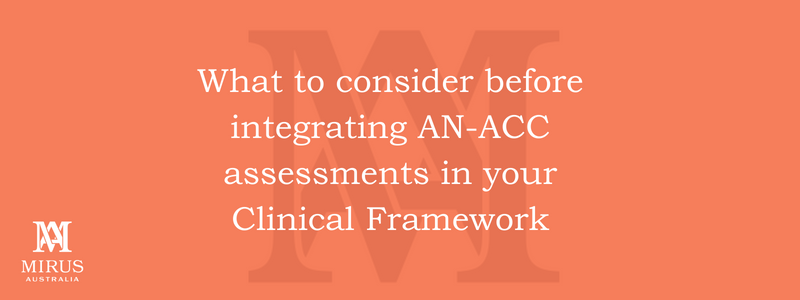Do you need to integrate AN-ACC assessments into your Clinical Framework?
July 5, 2022 | Aged Care Management

By Katie Airey, Quality, Risk & Compliance Product Lead
On October 1 2022, the aged care funding model is set to transition from the Aged Care Funding Instrument (ACFI) to the Australian National Aged Care Classifications (AN-ACC). The AN-ACC funding model was designed to identify the clinical characteristics of aged care residents that influence the cost of care and the proportion of care costs that, on average, are shared across residents versus those costs related to individual needs.
The AN-ACC assessment tool consists of nine sections incorporating the following assessments:
- Technical Nursing Requirements
- Resource Utilisation Groups – Activities of Daily Living (RUG-ADL)
- Australia-modified Karnofsky Performance Status (AKPS)
- Palliative Care
- Rockwood Clinical Frailty Scale
- Braden Scale – predicting pressure sore risk
- Australian Modified Functional Independence Measure (AM-FIM)
- De Morton Mobility Index (DEMMI)
- Behaviour Resource Utilisation Assessment (BRUA)
These assessments were designed to use as a conversational approach and have not been designed to undertake a formal clinical review.
The Department of Health’s fact sheet specifies ‘AN-ACC Assessment considers the attributes or characteristics that drive the cost of care for residential aged care residents and is not the same as care planning. Providers must continue to prepare care plans for each resident as required under the aged care quality standards.’
A key factor of the new funding model is that assessments for funding purposes will be undertaken by external assessors, which removes the administration burden from providers and allows them to compile assessments and care plans that are reflective of consumer driven care.
While some care management systems have started to release AN-ACC assessment tools into their suite of assessments, providers should consider whether integrating these assessments into their clinical framework is beneficial.
Consider how the assessments;
- Support comprehensive clinical assessment to identify and plan for clinical and personal needs
- support decision making to determine goals of care
- Identify resident preferences in relation to their care and service delivery
Other considerations prior to implementing the AN-ACC assessments into your clinical framework;
- Risk of inconsistency between comprehensive clinical assessments, care plans & AN-ACC assessment outcomes
- Workforce skills mix
- Training and education
- Effort required to make any transition
- Redefining clinical framework & information systems
We are currently working with over 40 providers representing 40,000 beds on their transition to AN-ACC. Across this portfolio, there is a wide variety of clinical systems used and approaches to whether to transition and when. Some providers initially were worried about the effort and technical complexity that may be involved in upgrading their systems or transitioning their care plans as a priority. By far the majority of providers are now considering a more measured approach to this transition. Which assessments may be useful to adopt over time (if any) and what is the time frame over which the organisation can cope with the effort to transition the data and training required for the clinical staff.
While each provider will need to consider what is best for their service, it is important to keep in mind there is no requirement or timing for providers to incorporate the AN-ACC assessments into their clinical framework. A more measured approach and plan will be less disruptive for the organisation and therefore more likely to result in greater success and benefit to the residents.
Keen to understand more? Contact us.


